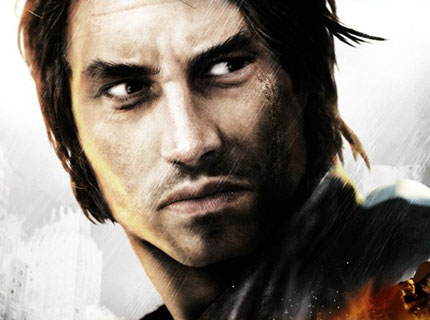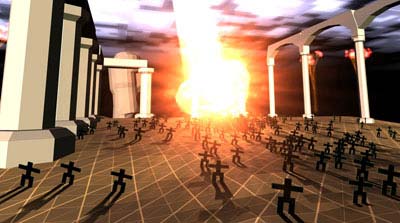 The main reason game development companies prefer creating console games over PC, is because PC games are so easily pirated. For years companies have tried everything to keep their games safe and their players legal, from CD keys to encrypted discs to draconian rootkits.
The main reason game development companies prefer creating console games over PC, is because PC games are so easily pirated. For years companies have tried everything to keep their games safe and their players legal, from CD keys to encrypted discs to draconian rootkits.In a few cases, these copy protection devices were so strict that legal buyers of the game were unable to play it. I myself was once unable to play a game after it detected I run a virtual DVD drive. The drive, mind you, I use when installing linux-based software to my VirtualBox, software that is usually distributed as an ISO for download.
The most memorable occurrence of this was BioShock. It was announced that the game would require players to activate their game online, and would only be allowed to install the game 5 times. Ever.
You can imagine how this upset many people. There was a public outcry on the gaming forums and the company eventually removed the activation limit last week.
The next big scandal was Assassin's Creed for PC. Some users noted funny internet traffic while playing the game, which has no multiplayer. It turns out that the game was "phoning home" every 3 minutes to make sure your copy was still legal. I have a wireless internet connection that isn't the most stable of ways to get online. On several occasions the game would completely lock up, as if waiting for something to happen, before continueing. I noticed that this didn't happen if my internet was disconnected. Proving the point that the game was indeed waiting for confirmation before continueing. This was not documented anywhere and users' permission was never asked, although upon finer reading of the license agreement it was found that by clicking "I Agree" you give them permission to collect " anonymous user data". Surprisingly this created little media stir.
But when it was announced that Mass Effect for PC would use a similar scheme (but only every 10 days or so) the general public exploded in rebellion, many urging players to pirate the game BECAUSE of the protection, thereby defeating the purpose and proving a somewhat elaborate point, which I'm getting to.
The "phone home" was removed, but in such a haste that for many people (your's truly included) the game can't even run. I'm hoping this will get fixed in the not-too-distant future, as I can't return the game.
 I found out today that Alone in the Dark uses the same system. When the game is installed it must activate, either over the internet or through lengthy phone conversations with technical support. When you uninstall the game, it must revoke its activation in much the same way. This means if your computer accidentally fails under the pressure of its daily workings, there is no way to legitimately uninstall the game and it will not allow you to install again until you have revoked the activation, which means more lengthy phone conversations to explain why you want to play the game on another computer (or again on the same computer).
I found out today that Alone in the Dark uses the same system. When the game is installed it must activate, either over the internet or through lengthy phone conversations with technical support. When you uninstall the game, it must revoke its activation in much the same way. This means if your computer accidentally fails under the pressure of its daily workings, there is no way to legitimately uninstall the game and it will not allow you to install again until you have revoked the activation, which means more lengthy phone conversations to explain why you want to play the game on another computer (or again on the same computer).If I may be frank, this is bullshit. If I pay for the game, I want to play the game. Why should I need to explain myself to some third party? "Yes I legally bought the game. No it is not installed on another computer. Yes I can give you my product key."
I understand that they don't want the game to be copied, but they're trying to hard to stop people from copying it, that they convince people to pirate the game simply to avoid the shlep of activating it! You're losing precious sales here, people!
 Look at Darwinia. The game has no copy protection whatsoever (as far as I can tell). It is indeed pirated and easily available on the internet, especially because it's a comparatively small download. I know a few people who illegally downloaded and played the game, but once they realized what a gem of a game it is, they went out and bought it as a sign of due diligence.
Look at Darwinia. The game has no copy protection whatsoever (as far as I can tell). It is indeed pirated and easily available on the internet, especially because it's a comparatively small download. I know a few people who illegally downloaded and played the game, but once they realized what a gem of a game it is, they went out and bought it as a sign of due diligence.We gamers give credit where credit is due. If we think a game is worth our R315 (Alone in the Dark), we'll gladly pay it. But I might think twice about it if I know I'm going to have to explain my purchase to some woman in an office 10 000km away, if not overseas. And then the game might not even work because of my shoddy internet connection! I can see it now.
"Hey John let's play Alone in the Dark!"
"OK but I need to get my internet running..."
...followed by pointless fiddling with a foil-covered paper plate in an attempt to direct the onmidirectional signal out a window towards a tower...
Bottom line: If you try too hard to stop people from pirating your game, they're going to pirate your game just to spite you. If you let people (relatively) freely distribute your game illegally, many people will feel obligated to pay for the game and you will end up with more sales.
Words:
"But it's not. It's basically an 18 to 28 year-old male dominated business of about 15 million. That's where most of the traffic is. Casual games on the net add to that, but they're all network-based."
-CVG Article




No comments:
Post a Comment